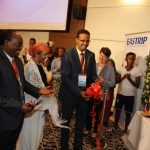
*****************************
East African Community Headquarters, Arusha, 17th June, 2019: The East African Community (EAC) Secretariat successfully concluded a three-day cross-border Field Simulation Exercise, conducted on the Kenya – Tanzania border at Namanga One Stop Border Post (OSBP), with critical results and lessons for pandemic preparedness and response.
Over 250 participants from both countries, besides those from Burundi, Rwanda, South Sudan and Uganda took part in the exercise. The exercise was conducted based on a scenario of an outbreak of a disease that impacts both human and animal lives and their livelihoods, including agriculture, tourism, security, trade and the economy as a whole.The exercise created an opportunity in which participants were able to identify strengths and weaknesses and facilitate practical corrective actions at all levels.
During the Simulation Exercise, community members in Kenya and Tanzania participated in events based on an evolving scenario designed to evoke real responses. “Prevention and responding to epidemics is not a sole responsibility of the health sector but rather requires a collective effort from various sectors including the community” said Hon Ummy Ally Mwalimu, the Tanzanian Minister for Health, Gender Community Development, Elderly and Children while officiating opening ceremony on Tuesday morning.
As part of the scenario, early warning, infections and deaths in animals and human beings prompted the reporting and activation of national and regional preparedness and response mechanisms. The involvement of human health, animal health and other sectors reinforced the importance of the One Health approach and of appropriate risk and crisis communication, as well as cross-border collaboration.
Speaking on the official opening, the Cabinet Secretary for East African Affairs and Regional Development from Kenya, Hon Adan Abdallah Mohammed observed that with the looming Ebola epidemic in the neighbouring Democratic Republic of Congo, it was important for the two Partner States to collaborate and share experience when responding to cross-border outbreaks.
All Ministers while jointly officiating at opening of the exercise commended the partners for their support. Through imaginary scenarios under real conditions and public involvement, regional and national-level experts were able to test processes in place and identify opportunities for improvement of existing plans. Community members in both countries were able to see first-hand the importance of their involvement in emergency preparedness and response.
The Field Simulation Exercise was facilitated by the World Health Organisation with support from Deutsche Gesellschaft for Internationale Zusammenartbeit (GIZ) of the Germany government and other partners.
The simulation exercise participants worked diligently to avoid disruption of operations at the border and at other sites where activities took place. People working at and traversing the OSBP carried on with their regular activities, while actors posing as ill people tested plans in place to identify and isolate people with certain symptoms at the border. Other activities tested plans associated with transport of animals, readiness of airport response, and EAC coordination and advisory strategies.




